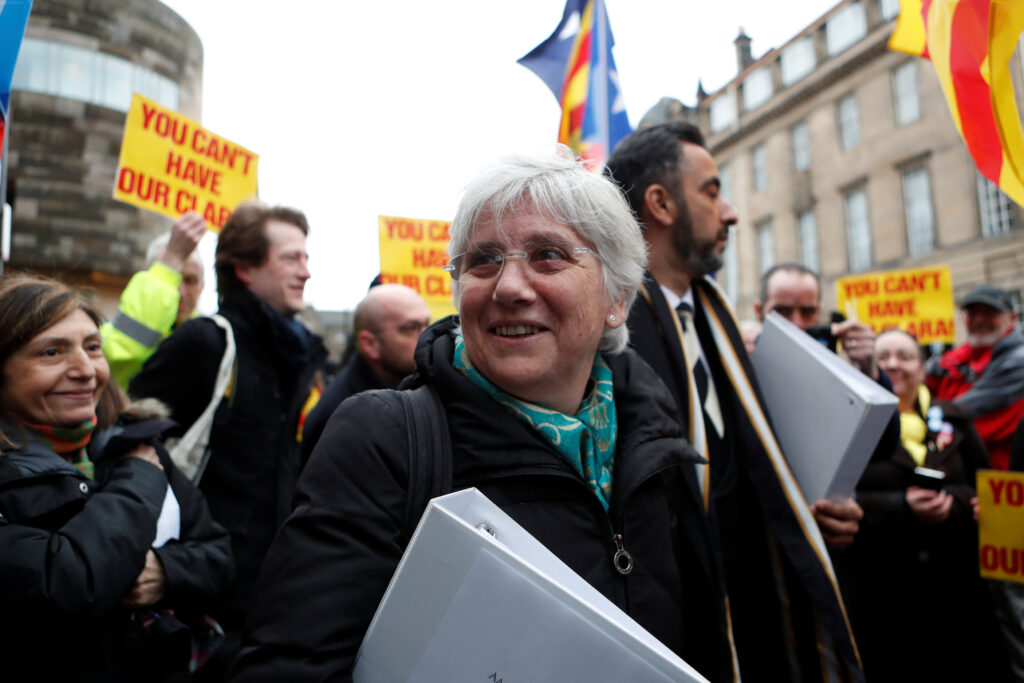28.10.2019 - 08:48
|
Actualització: 28.10.2019 - 09:48
Exiled Catalan minister Clara Ponsatí is one of the political figures who empathises the most with the young Catalans that have risen and taken to the streets. The Catalan economist, who resides in Scotland and works at the University of St Andrews, claims that people have breathed new life into a movement that Catalonia’s institutions and political parties had sent into a slumber. However, now she is worried that we might not make the most of the fresh momentum. For this reason —and inspired by the events in Hong Kong— she drew up a list of three demands (peace, amnesty and self-determination) that the Council for the Republic and the CUP have adapted. It is an attempt to articulate politically the strength of grassroots activism.
In this telephone interview Ponsatí talks about mobilisation, young Catalans, police violence and the failure of the institutions. She is very critical of Catalonia’s police force, the Mossos d’Esquadra, and remains hopeful about a hypothetical European arrest warrant. Finally, she discusses one of the absurdities of the Supreme Court’s recent verdict in the case of the independence leaders: the court has pinned Ponsatí’s actions on fellow cabinet minister Dolors Bassa, one of the convicted Catalan leaders.
Clara Ponsatí in Scotland (photo by Artita Shah)
—What’s your take on the protests. How do you feel about them?
—Right off the bat, I have to say the response has been spectacular. Well done. We have displayed great power and determination. It looked as if we were stuck in a slumber, but clearly we weren’t. It is very important for young people to have come out with such unprecedented strength. I’d say we’d never seen that sort of thing before. That’s why I’m feeling optimistic. But I struggle to see the goals and follow-up on that. I’m worried about not making the most of our strength.
—In your proposal you wrote: “people have realised that only the people will get the job done”.
—I believe that people were taken by surprise in the wake of the independence referendum held on October 1, 2017. They had placed their trust on their political leaders and they were persuaded that the result of the vote would be acted upon. People were expecting to be told what they were supposed to do to defend the Republic, but nobody did: there was no Republic for them to defend. The younger generations are the ones who have come to grips with this over the last two years and they realise that if they quit now, they will live under an authoritarian regime for the rest of their lives. They can’t abide that. Their message to us is this: “It might be alright for you to just light candles and wear a yellow ribbon, but not for us”.
—You penned a document with three very specific demands: peace, amnesty and self-determination. Why those three?
—I put pen to paper after collecting ideas and listening to people who were concerned about the lack of a political articulation to date. Our institutions are paralysed but, in contrast, there is a lot of energy on the streets. And it is important to have a message so that anyone who witnesses it will realise what goals all those people are pursuing. It is hardly a very original document, mind you. All three demands will be worked on and they might eventually be formulated differently. The actors who have picked it up are expressing them in other ways. The Council for the Republic has produced its own interpretation, whereas the CUP have also put out a version of their own. Some variations include a fourth demand. In the coming weeks it’s important to have a collective message that everyone can endorse.
—Is Hong Kong a reference point?
—Hong Kong is a great source of inspiration. They have taught us some superb lessons. Their five demands are dead clear and that brings everyone there together and makes them stronger than they’d be if they relied on street protests alone. Now, it’s worth noting that the Chinese have stated their police is not as brutal as Catalonia’s Brimo [anti-riot squad]. And that much is true. Plus, Hong Kong’s legal system offers broader guarantees than ours. None of Hong Kong’s protestors were sentenced to ten years in prison in the aftermath of the Umbrella Revolution. Besides, now these lads are free to travel the world, with the court’s permission. We are fighting to leave a regime that’s turned authoritarian on us, whereas they are fighting not to become part of one. Nowadays their judicial system is still British. In contrast, courts in Catalonia have no qualms about sending detainees to jail pending trial. Even if some of our lads had actually set fire to a rubbish skip —which I don’t know—, they would not deserve to be held on remand by any stretch of imagination. Why are they being thrown in jail? What’s going on? When we mention the occupation forces, we’re not just talking about the police. We’re seeing a no-holds-barred clampdown, there is no rule of law.
—Some have tried to frame the discussion around the subject of condemning violence against rubbish skips.
—Whenever the police are gone, so is any trace of violence. And that’s the end of that. The day when the Brimo and the Spanish riot police take no action, there is no violence. None whatsoever. End of. The whole rhetoric about “you must condemn violence, you must condemn it …” Everyone already knows we are a peace-loving people. Buying into their narrative is affording them an advantage. Have they ever condemned any violence? For goodness’ sake! I can’t bear it and I think that buying into it is not very clever at all: it is a trap. Once you’ve fallen into their rhetoric trap, there’s no way out.
—These days there are people who believe the protests need a leader. Well, perhaps if we had a political leadership, people wouldn’t be rallying in the streets. The leadership would have toned it all down.
—But why should we settle for a political leadership that tones things down and never leads? I can understand that the leaders of the street protests cannot show their faces. I do, because repression is pervasive. But a faceless, voiceless movement will struggle to make any progress and to advance its cause. I’m hoping we’ll have a political leadership at some point. The trouble is, we are afraid that those who lead us might throw a spanner in the works again. For street activism, articulating whatever it wants is a way of preventing the political parties and institutions from slowing us down.
Clara Ponsatí in Scotland (photo by Artita Shah)
—What’s your opinion of Tsunami Democràtic’s “sit and talk” slogan?
—In terms of communicating our message abroad, it is fine. But what are we supposed to “talk” about? The subject matter of the discussion is important. It’s important to know what it is that they want to talk about and negotiate. The idea that orderly Catalans are willing to sit down for talks is great, but we cannot endorse the notion that merely sitting down for talks would be a victory in itself. It wouldn’t.
—Spanish PM Pedro Sánchez was unable to hold a meeting in the HQ of his government in Barcelona. España Global, the Spanish government’s unionist propaganda department, had to cancel an event in the city just the other day. And the police were driven out of Barcelona’s Plaça d’Urquinaona by protestors. In other words, not even sheer force is enough to defeat us.
—Quite. It’s obvious that force is not persuasive and the people are willing to hold their ground. They do not control our territory because they do not control our hearts and minds. It’s not just that España Global had to cancel their meeting, but they also had to get rid of the animated video they had made about the trial [of the Catalan leaders, which many found offensive]. One of their biggest problems —and ours, too— is that you need to know your opponent. And these people do not know us. There’s a great deal of ignorance. They don’t even know who they are communicating with abroad. Did they honestly think the cartoon would convince anyone of the virtues of Spain’s democracy and rule of law? I’ll stop there, though. We mustn’t underestimate them. Let’s not do that.
—Young Catalans have a hard time telling apart the Spanish police from their Catalan colleagues.
—I don’t want to give an intemperate answer, but the conduct of the Catalan police has been extremely regrettable. They are fully under the command of Spain’s Interior Ministry. I can’t say whether it’s their commanding officers, minister Buch or someone else. I guess they must know.
—On a different note, you might become a member of the European parliament, post-Brexit.
—The latest news seems to suggest that Brexit will happen in January and, therefore, UK MEPs would withdraw in the spring of 2020. That would give the remaining member states a few extra seats and that’s when I might get in, you’re right. Of course, the European Court of Justice still needs to deliver a judgement on the subject of immunity, so that’s still up in the air. Do I see myself as an MEP? We’ll see. If things work out and I am able to, I guess I’ll have to take the office.
—Speaking about the verdict, isn’t it bizarre that the court confused Dolors Bassa with Clara Ponsatí?
—It is. Spain’s institutions have sunk so low that they can’t get anything right anymore. The president of Spain’s senate is a compulsive plagiariser, political leaders are handed academic qualifications without taking any exams and the Supreme Court is unable to pen a verdict giving everyone credit for their own actions. I love Dolors Bassa and she deserves credit for many things, but I’m afraid my merits are mine and mine only (1). It is crassly clumsy, but it is also a sign of the regime’s downfall.
—Scotland’s authorities have not received a European arrest warrant against you.
—A few days ago it seemed a done thing. Perhaps they are struggling with the English translation or they are trying to come up with suitable arguments. Either way, it’s not been issued yet. Here in Scotland there is no such thing as the crime of sedition. Likewise, misuse of public funds has a different meaning than in Spain: you need to have actually pocketed the cash. And there is no mention of that in the Spanish court’s ruling. It’s not looking good for them, I don’t think. Especially after the spectacle of the trial: the main discussion would be whether I might be guaranteed a fair trial or not.
—In the mid term, how will things pan out, you think? Will the protests become more politicised? Should we give up on Catalonia’s regional government?
—Myself, I’ve given up on the regional government as the key driving force behind Catalonia’s transition to a Republic, at least for now. Things might be different in a few months, with a new parliament. But not with the current legislature. I’d like to be proven wrong, though. After all, we elected them on a restitution platform and to make the Republic happen. That was their election manifesto. So far they’ve not implemented it. They have given in to Spain’s authority.
—Some are saying the whole political leadership needs to go or else we’ll get nowhere.
—You can’t be so drastic. You can’t expect overnight changes on that scale. At the moment we can see how some names have exited the political arena, although in some cases they’ve not gone far enough, but we’ll have to see what names pop to the surface and how. I have no faith in the Catalan parliament, but that doesn’t mean I don’t have any faith in some MPs.
—Everyone has a role to play: president Torra sends letters to the Spanish PM and insists that talks must be held. Young Catalans have taken to the streets. Is there a problem, if everyone does their bit? Why should we want a president marching in the street and young lads who won’t even drop a gum wrapper on the ground?
—I agree in part. But there are limits. Let’s watch out for any attempts to thwart certain efforts. It is dangerous. We’ll see.
—What structures might emerge? The street, the street with the Council?
—I’m not too sure. I think street protests must show much more sustained strength and we must be able to put Spain’s economy on the ropes. That will open a window for negotiation. In a civil disobedience scenario, I believe you need to target the economy’s building blocks.
—Consumers switching to non-Spanish providers, strikes, rallies, cutting off roads?
—Above all, rallying. Making it difficult for the economy to function as usual. We could spare ourselves all that, if Europe and the powers-that-be knew better. But only the other day the European parliament voted to veto a debate on the Catalan issue. They wouldn’t even allow that! Most of the establishment will have none of it. However, when these things change, they do so very fast. But for now nobody should hold their breath hoping that the establishment will be democratic enough to change that. They have shown that they are willing to put up with nearly anything.
—Who do you see as a possible mediator?
—Ultimately, it’s all up to us. If we take action, they might do, too. But we must act first.
__________
Translator’s note:
(1) The recent Supreme Court verdict sentencing 9 Catalan leaders to long prison terms wrongly attributes decisions taken by Minister Ponsatí in 2017 to Employment minister Dolors Bassa, who has been convicted partly as a result of this confusion. Ponsatí’s remarks on this point are meant to be ironic.




